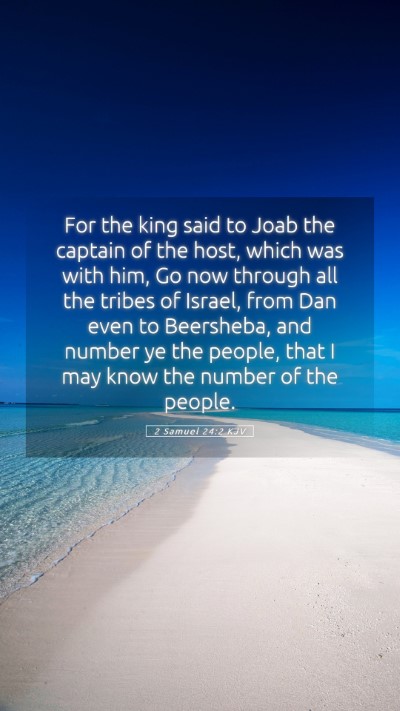Understanding 2 Samuel 24:2
The verse 2 Samuel 24:2 states: "And the king said to Joab the commander of the army, who was with him, 'Go throughout all the tribes of Israel, from Dan to Beersheba, and number the people, that I may know the number of the people.'" This request from King David marks a significant moment in his reign and is steeped in theological meaning and moral implications.
Bible Verse Meaning and Commentary
The command from David to Joab to count the people can appear as a straightforward directive. However, insights from notable public domain commentaries reveal deeper implications of this action.
-
Matthew Henry:
Henry suggests that David's initiative to count the people stemmed from pride and a desire for military strength. He emphasizes that reliance on numbers rather than on God can lead to sin. Henry notes that God desires His people to trust in Him, not in their own might or resources.
-
Albert Barnes:
Barnes discusses the historical context, indicating that such a census could signify a preparation for war or taxation. He highlights the importance of the census as a way for the king to assert his strength but warns against misplaced confidence in human resources rather than divine providence.
-
Adam Clarke:
Clarke provides a detailed cultural context, explaining that counting the people was customary for military organization. However, he points out that the act may have led to David's downfall, showcasing how leaders must be cautious in their motivations and actions.
Significance of the Verse
This verse embodies themes of leadership, accountability, and the relationship between human authority and divine sovereignty. David's intention to count the people suggests a potential drift from reliance on God, demonstrating the tension between earthly power and heavenly guidance.
Reflection on Trust
This scripture serves as a poignant reminder of the human tendency to place faith in tangible resources. David's desire for a census could be viewed as a moment of weakness, initially driving him away from dependence on God's promises. Believers today can reflect on their sources of trust—whether they seek security in numbers, wealth, or divine assurance.
Application to Daily Life
For modern readers, the lessons from 2 Samuel 24:2 can be transformative. It emphasizes the necessity of relying on God’s wisdom in decision-making rather than solely on personal assessments or material strengths. In a world that often values wealth and accomplishments, this passage beckons individuals toward spiritual introspection and reliance on divine guidance.
Bible Study Insights
As you engage in your Bible study, consider utilizing tools such as commentaries, concordances, and study guides to deepen your understanding of similar verses. This will enhance your Bible verse interpretations and grow your Bible study group discussions.
Related Bible Cross References
- 1 Chronicles 21:1-2 - This reference recounts a similar census, highlighting the consequences of David's actions.
- Psalm 20:7 - "Some trust in chariots and some in horses, but we trust in the name of the Lord our God," reinforcing the theme of trust in God over military might.
- 2 Samuel 24:10 - Reflecting on David's remorse after the census, showing the spiritual journey and repentance.
Conclusion
In 2 Samuel 24:2, we find a rich narrative that prompts contemplation regarding leadership, reliance on God, and the human condition. This verse's interpretation can lead to a profound understanding of Scripture as it relates to faith, obedience, and the consequences of our actions. Whether for personal reflection or group study, delving into such verses encourages a deeper spiritual awareness and guides readers toward meaningful application in their lives.


